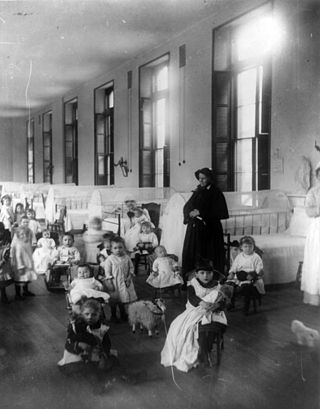Related Research Articles

Adoption is a process whereby a person assumes the parenting of another, usually a child, from that person's biological or legal parent or parents. Legal adoptions permanently transfer all rights and responsibilities, along with filiation, from the biological parents to the adoptive parents.

An orphanage is a residential institution, total institution or group home, devoted to the care of orphans and children who, for various reasons, cannot be cared for by their biological families. The parents may be deceased, absent, or abusive. There may be substance abuse or mental illness in the biological home, or the parent may simply be unwilling to care for the child. The legal responsibility for the support of abandoned children differs from country to country, and within countries. Government-run orphanages have been phased out in most developed countries during the latter half of the 20th century but continue to operate in many other regions internationally. It is now generally accepted that orphanages are detrimental to the emotional wellbeing of children, and government support goes instead towards supporting the family unit.
Holt International Children's Services (HICS) is a faith-based humanitarian organization and adoption agency based in Eugene, Oregon, United States, known for international adoption and child welfare. The nonprofit works in thirteen countries, including: Cambodia, China, Colombia, Ethiopia, Haiti, India, Mongolia, Philippines, South Korea, Thailand, Uganda, Vietnam, and the United States. This work includes a range of services for children and families including efforts in nutrition, education, family strengthening, orphan care, foster care, family reunification, and child sponsorship. The organization's stated mission is to seek a world where every child has a loving and secure home.
International adoption is a type of adoption in which an individual or couple residing in one country becomes the legal and permanent parent(s) of a child who is a national of another country. In general, prospective adoptive parents must meet the legal adoption requirements of their country of residence and those of the country whose nationality the child holds.
In the United States, adoption is the process of creating a legal parent–child relationship between a child and a parent who was not automatically recognized as the child's parent at birth.

Islamic views on adoption are generally distinct from practices and customs of adoption in other non-Muslim parts of the world like Western or East Asian societies. Adoption in the western sense of the word is not recognized in Islam.
Human rights in the United Arab Emirates (UAE) are substantially restricted. The UAE does not have democratically elected institutions and citizens do not have the right to change their government or form political parties. Activists and academics who criticize the government are detained and imprisoned, and their families are often harassed by the state security apparatus. There are reports of forced disappearances of foreign nationals and Emirati citizens, who have been abducted, detained and tortured in undisclosed locations, and denied the right to a speedy trial and access to counsel during investigations by the UAE government. Human Rights Watch states that Emirati laws maintain capital punishment and discriminate against women, migrants and LGBT individuals.

Lesbian, gay, bisexual and transgender (LGBT) people in the United Arab Emirates face discrimination and legal challenges. Homosexuality is illegal in the United Arab Emirates (UAE) and under the federal criminal provisions, consensual same-sex sexual activity is punishable by imprisonment; extra-marital sexual activity between persons of different sexes is also illegal. In both cases, prosecution will only be brought if a husband or male guardian of one of the participants makes a criminal complaint. The penalty is a minimum of six months imprisonment; no maximum penalty is prescribed, and the court has full discretion to impose any sentence in accordance with the country's constitution.

The Adoption and Safe Families Act was signed into law by President Bill Clinton on November 19, 1997, after having been approved by the United States Congress earlier in the month.

Human rights in Dubai are based on the Constitution and enacted law, which promise equitable treatment of all people, regardless of race, nationality or social status, per Article 25 of the Constitution of the United Arab Emirates. Despite this, Freedom House has stated: "Extreme forms of self-censorship are widely practiced, particularly regarding issues such as local politics, culture, religion, or any other subject the government deems politically or culturally sensitive. The Dubai Media Free Zone (DMFZ), an area in which foreign media outlets produce print and broadcast material intended for foreign audiences, is the only arena where the press operates with relative freedom."
There are several notable cultural variations in adoption. Adoption is an arrangement by which an orphaned child or one whose biological parents are unable to care for them is "adopted". While all societies make provision for the rearing of children whose own parents are unavailable to care for them, cultures and legal systems treat an adopted child in different ways ranging from equivalent status to legitimate biological children to guardianship.
According to Human Rights Watch, there is substantial discrimination against women in the United Arab Emirates. The status of women has improved over the years. UAE performs better on metrics of gender equality than many other states in the Gulf region, and it has been making reforms to protect women's rights and empower women in different sectors. Critics describe some of these reforms as window dressing.
Adoption in Australia deals with the adoption process in the various parts of Australia, whereby a person assumes or acquires the permanent, legal status of parenthood in relation to a child under the age of 18 in place of the child's birth or biological parents. Australia classifies adoptions as local adoptions, and intercountry adoptions. Known child adoptions are a form of local adoptions.
Islam is the majority and official religion in the United Arab Emirates, professed by 74.5% of the population as of 2020. 63.3% are Sunni, 6.7% are Shia, while 4.4% follow another branch of Islam. The Al Nahyan and Al Maktoum ruling families adhere to the Maliki school of jurisprudence. Many followers of the Hanbali school are found in Sharjah, Umm al-Quwain, Ras al-Khaimah and Ajman. Their followers include the Al Qasimi ruling family. The other main religions present in the country include Christianity (12.9%), Hinduism (6.2%), and Buddhism (3.2%). Zoroastrians, Druze, Baha'i, Judaism, and Sikhism are also practiced by some non-nationals. 1.3% of the population is agnostic.
The following outline is provided as an overview of and topical guide to adoption:
The legal system in the United Arab Emirates is based on civil law, and Sharia law in the personal status matters of Muslims and blood money compensation. Personal status matters of non-Muslims are based on civil law. The UAE constitution established a federal court system and allows all emirates to establish local courts systems. The emirates of Abu Dhabi, Dubai and Ras Al Khaimah have local court systems, while other emirates follow the federal court system. Some financial free trade zones in Abu Dhabi and Dubai have their own legal and court systems based on English common law; local businesses in both emirates are allowed to opt-in to the jurisdiction of common law courts for business contracts.

Emirati nationality law governs citizenship eligibility in the United Arab Emirates (UAE). The law is primarily jus sanguinis. Foreigners who meet certain criteria may be naturalized and granted citizenship. Gulf Cooperation Council citizens are allowed to live in the UAE without restriction and have the right of freedom of movement.
Migrant workers in the United Arab Emirates describe the foreign workers who have moved to the United Arab Emirates (UAE) for work. As a result of the proximity of the UAE to South Asia and a better economy and job opportunities, most of the migrant foreign workers are from India, Nepal, Sri Lanka, Bangladesh, Philippines and Pakistan.
The second-parent adoption or co-parent adoption is a process by which a partner, who is not biologically related to the child, can adopt their partner's biological or adoptive child without terminating the first legal parent's rights. This process is of interest to many couples, as legal parenthood allows the parent's partner to do things such as: make medical decisions, claim dependency, or gain custody in the event of the death of the biological parent.

Marriage in the United Arab Emirates is governed by a combination of Islamic principles, local traditions, and legal regulations. Islamic marriages within the country are conducted according to Sharia law, where the groom and bride are both Muslims, or the bride is from 'Ahl Al-Kitaab', typically referring to Christianity or Judaism. Non-Muslim residents and visitors can marry through the UAE Personal Laws for non-Muslims or their respective religious or national laws.
References
- 1 2 "Fostering and sponsoring children of unknown parentage". The United Arab Emirates' Government portal. Archived from the original on 13 July 2024. Retrieved 16 January 2025.
- ↑ Khalifa bin Zayed Al Nahyan (8 March 2016). Federal Law No. 3 of 2016 (Report).
- ↑ Asif, Yusra (7 February 2024). "UAE laws on fostering and sponsoring children – All you need to know". Alarabiya. Retrieved 16 January 2025.
- ↑ Fisher, Amanda (6 March 2015). "Adopting orphans and breaking taboos in Dubai". Al Jazeera. Archived from the original on 18 May 2024. Retrieved 16 January 2025.
- ↑ Anwer, Laraib (6 February 2024). "UAE: Is it legal to adopt a child? Laws, eligibility explained". Khaleej Times. Archived from the original on 22 March 2024. Retrieved 16 January 2025.
- ↑ "Intercountry adoption - United Arab Emirates". U.S. Department of State. Archived from the original on 17 December 2024. Retrieved 16 January 2025.